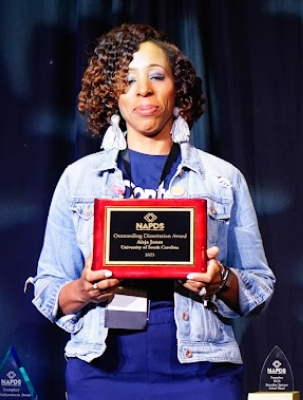Outstanding Dissertation Award
2023 Award Winner Dr. Aisja Jones, University of South Carolina

Aisja Jones earned her Doctorate of Education in Curriculum and Instruction in December 2022. Her dissertation title was Evaluating the Impact of Reciprocal Teaching Embedded Within a Web 2.0 Tool Upon Fifth-Grade Students’ Reading During an Integrated Readers’ Workshop at a Professional Development School. The study centered on Dr. Jones fifth-grade students who struggled to read expository text. As a reflective PDS educator, Dr. Jones turned to action research to take ownership of the problem and adjusted her instruction in an effort to resolve it. Dr. Jones is an educator that is committed to transforming inequitable systems from within. She truly represents the NAPDS mission of educational leadership, reciprocal professional development, and collaborative inquiry.
Nominations should be submitted electronically using this link before 11:59 PST on December 5, 2025.
PURPOSE
The purpose of this award is to recognize outstanding recent doctoral candidates in an education field (or closely related field, e.g., school psychology) whose dissertation research contributes significantly to an understanding of some aspect of the partnership between schools and universities. The award is intended to encourage participation of individuals with new doctorates in the activities of the association by providing a forum for presentation of their research that uses or reflects SUP practices, which includes the Second Edition of the NASUP Nine Essentials.
ELIGIBILITY
Eligible individuals will have completed their doctoral degree within the past 4 semesters (Spring 2024, Fall 2024, Spring 2025 or Fall 2025). Individuals do not have to be NASUP members. Dissertation studies should align to problems of practice related to school-university partnerships with a direct connection to at least one of the NASUP Nine Essentials (full document linked here). Self nominations are accepted.
APPLICATION MATERIALS
The application materials must include one file which includes the following parts:
- A narrative describing the dissertation study that should be no longer than 4 single-spaced pages, 12 point font with 1 inch margins. The narrative should include the following:
- Clear connections to one of the NASUP Nine Essentials
- A concise description of:
- The studies’ context
- The theoretical and/or conceptual frameworks used in the study
- The research questions with the data sources and data analysis processes used to examine the research questions
- The findings and discussion of the study with clear implications to school-university partnerships;
- The nominee’s vita/resume; and
- The dissertation signature sheet indicating that the individual has successfully completed their dissertation.
AWARD
The award shall consist of a plaque commemorating the award and $500. The recipient shall also be provided with a one-year membership to the NASUP. The recipient will be invited, at the NASUP Annual Conference to (a) present a summary of the doctoral research and (b) facilitate a mentoring session for doctoral students/candidates.
SELECTION CRITERIA
The committee shall base its evaluation of the dissertation research submitted on the following criteria:
- importance of the topic to theory development and/or practical applications of SUP practices, which includes connections to the Second Edition of the NASUP Nine Essentials
- soundness of methodology;
- organization and clarity of the findings and the impact of the study; and
- implications for school-university partnerships
SELECTION PROCESS
There will be one recipient selected. The committee shall communicate the committee’s decision to the chair of the NASUP Awards Committee who will then present it to the Leadership Team of the NASUP for their approval. The chair of the NASUP Awards Committee shall notify the author of the winning dissertation in advance of the NASUP Annual Conference.
PRESENTATION OF THE AWARD
The chair of the NASUP Awards Committee shall present the award to the winner at the annual conference.
PUBLICITY
The award shall be publicized in the publications of the NASUP, on its website, and in other appropriate NASUP venues.
Previous Award Recipients
2025
no awardee
2024
no awardee
2023
Aisja Jones, University of South Carolina
2022
Megan Lynch, Pennsylvania State University
2021
Catherine Wade, University of North Florida
2020
Dwayne Ray Cormier, Pennsylvania State University
2019
Christopher Kennedy, Ohio University
2018
Mary Elizabeth Higgins, Pennsylvania State University
2017
Kelly Mark, Pennsylvania State University
2016
Mary Jayne Coon-Kitt, Pennsylvania State University